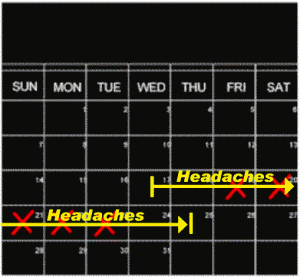Headaches may accompany the menstrual cycle and present in a number of ways.
Menstrual Migraines
Menstrual migraine headaches are common and temporarily disabling. They usually occur just before the onset of a menstrual flow or during the first day. They are triggered, in susceptible individuals, by the sudden drop in hormones accompanying the premenstrual phase.
Good success in treating menstrual migraines can usually be achieved through the use of BCPs:
- In some cases, low-dose monophasic BCPs are effective at suppressing the menstrual migraines.
- In some cases, the 7 days “off” BCPs each month is too long and the accompanying hormone changes trigger the headaches. These women do well for a few days during their “off” week, but then develop headaches at the end of the week. For these women, shortening the “off week” to only 3 days will frequently provide them relief from their menstrual migraines. There is still a change in hormones, but about the time the menstrual migraine is going to begin, the reinstitution of the BCPs prevents the migraines from starting.
- In some cases, it will be necessary to go to continuous BCPs to achieve good migraine suppression.
- In some cases, BCPs are not effective in controlling the menstrual migraines and other treatments must be used.

Women who experience migraine headaches preceded by an aura have been found to have an increased risk of stroke, particularly in the presence of other risk factors such as smoking. Some physicians recommend that because of this risk, these women should never use combination oral contraceptive pills, which may further increase the risk of stroke. Others disagree, believing that this should be an individualized risk/benefit assesment for each patient. Most are in agreement that progestin only pills may be safely used among these women.
Sinus Headaches
Sinus headaches may be more pronounced during the days leading up to the menstrual cycle, due to changes in hormone levels and their impact on sinus mucosa and fluid retention. These headaches have their focus of pain in the paranasal sinuses which become sensitive to direct digital pressure, and also by the indirect pressure of putting the head down between the knees. In addition to the usual methods of treating sinus headaches (analgesics, decongestants, antihistamines, antibiotics, as appropriate), cyclic symptoms can often be controlled by BCP suppression of ovulation.
Tension Headaches
Tension or stress headaches may also worsen or improve, depending on the menstrual cycle. In these cases, hormone changes or fluid retention may play a role in the development of such headaches in susceptible individuals. BCPs can often improve these headaches, although occasionally, the BCPs may aggravate them. A therapeutic trial of BCPs is often undertaken.
